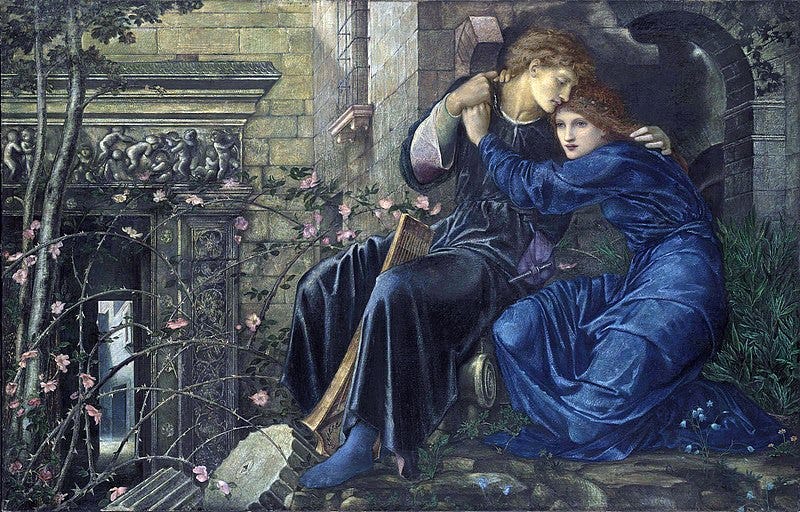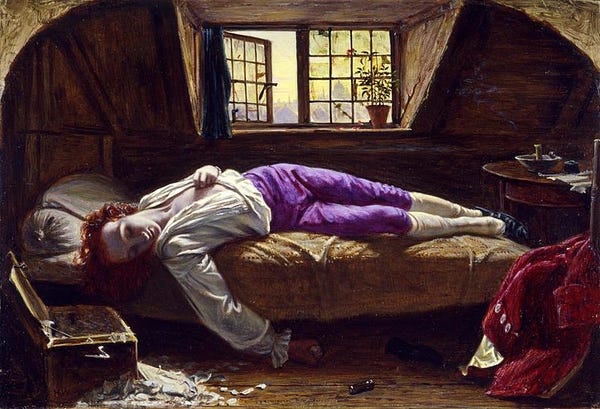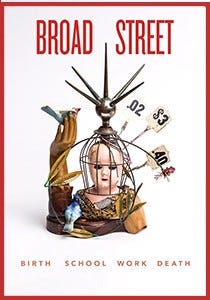Looking back and clinging to life.
“But I just don’t feel old! I’m not ready to die.”

I was going to die.
I had a brain tumor; it had grown back, I could feel it boring down into the roof of my mouth, and now I was going to die. I couldn’t accept it, couldn’t fight it, though I declared, But I’m not ready to die!
Then I woke from the dream.
I was relieved to have the rest of my life back. But it left me with a question: Are we ever ready to die?
I had just come back from a conference on pediatric cancer where one of the speakers declared that for children the goal is to cure the cancer, but for adults the aim is more likely to merely extend life so that the patient can reach certain milestones, such as a daughter’s wedding, the birth of a grandson, a wedding anniversary. That struck me as false. I remembered the ten-year old in our neighborhood who was dying of leukemia and told her doctor, “I just want to finish fourth grade. Do you think I can?”
A pediatric oncology nurse I spoke with at the conference confirmed that children with terminal cancer have their own milestones, just like adults, and are willing to endure a little extra physical suffering to reach them. And then there are adults, like my father, for whom milestones are not enough because they desperately want to continue puttering, no matter how slowly they go.
At age eighty-seven, my dad could barely hear, walk, or see, and was suffering from both cancer and advanced heart disease. I didn’t expect him to live much longer. He was a deflated shell of his former self; crinkled skin devoid of color draped like crepe paper from his skeletal frame. Sensitive to the stabbing heart pains that told him to subdivide the moments he had left in this world, he had slowed down like an old-fashioned watch that had come unwound. Yet when I suggested he enter a hospice program, he replied, “But I just don’t feel old! I’m not ready to die.”
“You don’t have to be old to die,” I said, reminding him of my brother’s death at the age of fifty-five. I didn’t want to see the death of my father, the last remaining living member of and tie to my nuclear family. But I also didn’t want him to die in pain or tethered to machines that kept his body ticking when his mind had already left the scene. “You can’t determine when you’re going to die, Dad, but you can determine howyou’re going to die,” I stressed.
We talked about what would happen if he didn’t sign advanced directives specifying no resuscitation heroics. How if his heart stopped beating, his frail body probably wouldn’t respond well to all the jolting of chest compressions strong enough to break bones. How most terminally ill patients, when given a video showing those extreme measures, opt out, as do most doctors in their living wills. How cancer patients who get hospice care actually live longer than those who don’t. How he would be more comfortable at home with a hospice nurse visiting him several times a week and spending an hour at each visit, than in the hospital with nurses who swept in and out of the room so briefly he’d barely know they were there. It all made sense and my dad was a logical person, so when the time came, he agreed to have home hospice care with no extreme measures.
But he never agreed to die.
At one point during his last days, when he wafted in and out of consciousness and wasn’t speaking, he woke up, his eyes clouded and confused. And then there was a glimmer of lucidity when he focused on me. I thought this would be the time, like in the movies, when he would impart a few wise words and tell me he loved me, and then the light would go out of his eyes and his head would fall back on the pillow as he died. Instead he used all his remaining strength to slowly spit out: “I … DON’T … WANT … TO … DIE.”
Those were his last words.
***
I feel like a murderer. Should I not have stewarded him into hospice care at home, but instead let him become a frequent flyer at the emergency room so he could die perhaps a month or two later — in more pain? What is a month more of life worth? I heard him struggle all night as the congestion in his lungs caused the distinctive death rattle.
At that point, most people just give in and go quickly.
My dad kept trying to clear his throat.
I was in agony, hearing his fluids drown him while he continued to struggle in a fight I knew he could not win.
This denial of death is not unusual. A friend told me that when his father was dying of cancer and the physician told him there was nothing more that could be done, his father stabbed his finger in the air at the doctor while saying, “I’ll prove you wrong!” Then he slammed his fist on the covers. He died a week later.
That reminds me of the Buddhist monk who called his disciples to his sickbed and said, “Now pay attention, this is how a master Buddhist dies.” Then he started cartwheeling his arms, yelling, “I don’t want to die! I don’t want to die!”
***
Sometimes we think we are ready to die but that there may be one more thing we need to do before we can leave.
The mother of one of my friends decided she no longer wanted to live after many strokes had disabled her to such a point that she was totally dependent on her daughters. Not able to afford nursing care, these women fed, bathed, and toileted her the way she once did for them, seemingly without complaint.
But the mother decided she had had enough. She purposely stopped eating and drinking so she would die. Several days went by with all the relatives coming to say their goodbyes, and all the friends like me coming to keep the relatives company. When not visiting with friends and family, my friend’s mother spent most of her time sleeping. It seemed like she would just quietly slip away, and then one day she woke up and told her daughter she wasn’t ready to die.
Surprised that her mother had lost her resolve after so many days of not eating or drinking, the daughter asked why.
“I want one last cup of coffee,” she said.
***
And then there’s my brother, who slipped peacefully away, accepting his fate and curious about what death had in store for him.
I visited him when ALS had robbed him of all movement except breathing, talking, and swallowing. We talked about how his disease was taking a toll on not just him but his family, how he had lived a good life and had no regrets, and how he was fortunate to live long enough to see his sons grown and out on their own.
“I don’t know,” he said, gazing out of the side porch windows at the trees around him. “Once you’ve been checkmated, what’s the point of continuing the game?”
“I can’t imagine what it’s like not to exist anymore,” I said to him.
“Oh I can,” he said, taking a sip from his ventilator. “I think it will be peaceful.”

Is that why he was willing to die? Had his life become so unbearable that he was willing to seek the peace that death offered him? My dad’s physical state wasn’t that much better than Joe’s at the end of his life, but he wasn’t willing to make the leap into oblivion. Why not?
It was the hospice nurse who told my dad that his irregular breathing was a sign he was actively dying and probably only had a few days left of life. I rushed back from a conference so I could be with him, not quite believing his end was finally here after he had survived so much that doctors had said would kill him. His situation always reminded me of that humorous summary of what Jewish holidays are all about: “They tried to kill us. They didn’t succeed. Let’s eat.”But when I went into his bedroom and saw him sitting hunched over the edge of the bed, his hands on his knees, his head bowed, struggling to catch his breath — that was when I knew death was winning.
I sat and had a long talk with him. He told me all his regrets about what he didn’t accomplish in life. He didn’t travel enough, he didn’t make enough friends, he wasn’t a good enough father, he hadn’t made enough of a mark on the world. I tried to argue with him, telling him of the great respect his scientific colleagues had for him and his work and how his nimble mathematical mind was able to translate their research findings into an intelligible story of how the body worked.
“No, no,” he said with a dismissive wave of his hand. “It’s not like I was that great at math — it’s just that nobody else understood it.”
I also stressed what a good dad he was to tell me all those stories growing up — the stories that matured along with me, from tales of Madeline to tales from the lab where he worked — tales that inspired me to be a science writer. “I’ll miss you once you’re gone,” I said, tears slipping down my face.
“You will?” he replied, as if I were talking about remembering a passing acquaintance.
***
Apparently the need to be remembered is frequently voiced by the dying.
I watched a TED talk by a man who was an emergency medical technician on an ambulance crew and spent the last moments of life with dozens of patients he wasn’t able to save. He found that when he honestly answered yes to those who asked if they were going to die, there were common patterns in how they responded. Many wanted to live on in someone’s memory, and they asked the EMT if he would remember them. Others were more consumed by regret, such as ruing not spending more time with their families. The last common pattern, he said, touched him the most: “The dying need to know that their life had meaning. They need to know they did not waste their life on meaningless tasks.”
I think my brother knew this. He led a purposeful life, mindful of all the choices he made along the way. Rather than pursue a high-powered position at an elite university, he chose a more humble professorship at a university in Vermont so he could be close to the mountains he loved — also because, as he once wrote, “I feel best out in this countryside, where life melds into the quiet rhythms of nature.” He could have been a science superstar on the lecture circuit, but instead he chose to spend more time with his two sons and be the go-to parent when there were scraped knees, fevers, or fears and his wife, Elke, was completing medical school and her residency.
There was also a humility in Joe’s outlook on life that maybe made it easier for him to accept its end. We talked about how we both had what we called the “speck-in-the-universe philosophy” — we felt each of us plays a bit part in a vast world. Greatness is achieved not by personal accomplishments but by letting go of personal boundaries and being one with that far-reaching and eternal universe. So there is no need to be remembered, because in a sense one will always be here.
At the end of his life, my brother didn’t dwell on what he did or did not accomplish personally. Instead, as his world shrank due to his limited mobility, he focused outward: “I go as slowly as I can, savoring the sights, the sounds, the smells of life around. While others rush, oblivious, to their own ends, I choose, day by day, to linger while I can,” he wrote on his blog. He spent hours watching the woods around him, rejoicing when he heard a returning phoebe in spring and laughing when he saw his dog pounce on mounds of snow. He read the newspaper every day up until he died.
What use did a man in his condition have for news? Would it really matter in his life whether the next bill got passed in Congress? He was in pain and frustrated with his inability to move, but perhaps that prompted his mind to meld with the greater sphere that surrounded him.
Maybe by the time he died he was so practiced at going beyond himself that it didn’t take that much to make that next leap off the ledge of life. He was ready. Ready to say goodbye. Ready to be embraced by death. Ready to have his ashes spread under the stand of white birches he loved hiking to on the mountain that cast a shadow over his house.
***
“He put up a good fight.” “He battled his cancer.” “He was brave at the end.” These are things people say about the dying. But who is braver — the one who recognizes his end has come and looks death in the eye, or the one who wrestles with death? Or, like the knight in the Ingmar Bergman movie, talks Death into one final game of chess on the beach even though he is ultimately checkmated?
My son and I played Scrabble as we waited for my father to die. I played the word LIFE twice because it fit the board, and also because it was fitting. The Kaddish prayer the Jews say after the death of a loved one does not mention death once, but instead affirms the beauty of life.
***
The pediatric oncology nurse told me that once dying children reach their milestones, whether it is a trip to Disneyland or graduating fourth grade, they too often are ready to meet death. “Aren’t they afraid?” I asked her, remembering spending most of my childhood being afraid of the dark — afraid of what lay underneath my bed, let alone death. “Not really,” she responded. “They accept their own death and are much better about it than their parents.”
Will I ever accept my own death? If a ten-year old can, then surely I can. Annie Dillard suggests, in her book Pilgrim at Tinker Creek, that “the dying pray at the last not ‘please,’ but ‘thank you,’ as a guest thanks his host at the door.”
But my father never even said goodbye. He gripped life with an unyielding tenacity at the end because he didn’t feel he had lived it fully, or maybe because he was afraid of what came next. I couldn’t even get him to tell me whether he wanted to be cremated or buried. He was a man who loved and lived routines and who probably couldn’t fathom not being able to wear the same brown wool pants, white button-down shirt, and sable oxfords in the afterlife, whatever that was.
In contrast, my brother welcomed the comfort death would bring him. After watching the birds at his feeder one last time and taking medicine to ease his transition, he went off his ventilator, stopped breathing, and quietly left this world.
Leaving me to wonder what we can learn from the dying. Those at the end of their time on earth do not show us what to do on our deathbeds but what to do in our lives: to live fully, aware of what is around and beyond us; to appreciate each milestone; to savor each cup of coffee. But also to let go when the time comes. To not be afraid of death but instead to welcome nature’s embrace and being part of the elements again.
To say thank you before opening death’s door.
*****************************************************************************

Margie Patlak’s science writing has been published in Discover, The Washington Post, The Los Angeles Times, The Philadelphia Inquirer, and numerous other publications. Her personal essays have appeared in Proximity, Hippocampus,The Hopper, Cold Mountain Review, and Juxtaprose, where her essay “Rock of Ages” won First Honorable Mention in the 2018 Creative Nonfiction contest. Her nature memoir, More Than Meets the Eye, will be published by Down East Books in 2021.
Featured image: Edward Burne-Jones, “Love Among the Ruins,” c. 1873.









